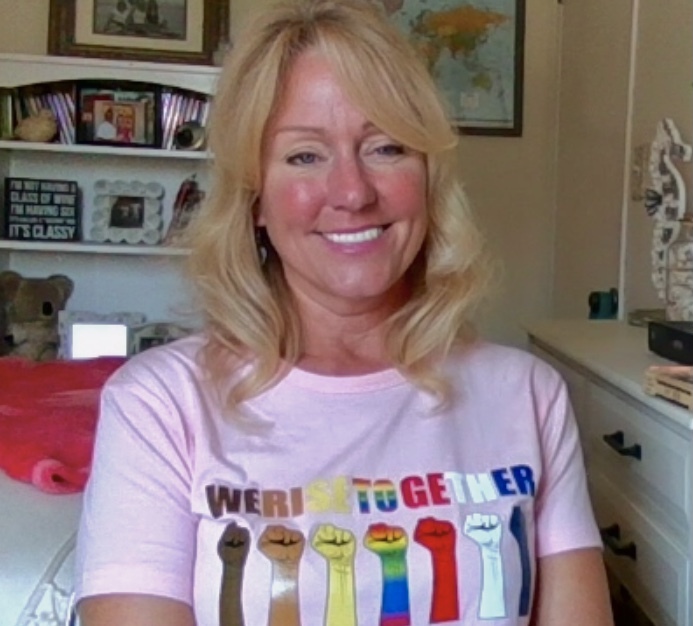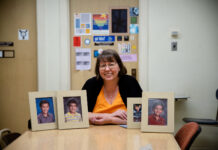
Feeling the dewdrop-covered grass tickle the small patch of bare skin on her ankle, she walks through the field toward the chicken coup to gather eggs for her morning breakfast. Her and her family cook them in a pan over a wood burning stove. They eat.
This was the way of life for history professor Sheryl Nomelli, who lived in a cooperative during the 1960s.
Nomelli dropped out of school in her early teens because of her limited exposure to an education. She had extensive freedom growing up in a cooperative in Napa Valley, which allowed her to do as she pleased.
“It feels very lucky to live through such an extraordinary time,” Nomelli said. “I had the freedom to wander and to live and to explore.”
Living in a cooperative in the 1960s was considered more of a hippie experience. But once she turned 10, she moved with her family to the city where her father became a minister.
“My parents went from one extreme, being liberal and following no religion to a rabid born again fanatical,” Nomelli said.
Switching from an isolated, closed off lifestyle in the country to a booming city was hard for Nomelli. She said her parents were not engaged in parenting, which left her and her brother to do whatever they wanted. Nomelli touched base on her lack of formal education as a child in an email interview
“Certainly it was hard to adjust to urban life and regular school which is why I often skipped school,” Nomelli wrote. “My parents were not really engaged enough to care if I attended or not.”
Nomelli eventually decided to go back to school. She took the California proficiency exam to get the equivalent of a high school diploma and began college at 15 at Shasta Community College.
She said she never pictured herself as a college professor. It was in college being lectured on women’s history when she realized she wanted to pursue teaching.
“I was a liberal history major but I couldn’t stand most of the classes I took, until I took my first women’s history class,” Nomelli said. “My professor had this huge head of hair that went all the way down to her ankles and she was crazy, but she talked about people in a way that got into their heads.”
Nomelli had to take time off of school in order to tend to take care of her two daughters.
“I did that for a couple of years and I married very young,” Nomelli said. “I also began my family very young which left me no time to continue my education.”
She worked nights and weekends to support her family while her husband worked days. This left them little time to spend with one another.
After a few years, Nomelli decided to return to school.
“Getting an education was an investment in our future,” Nomelli said. “We had to take out student loans to do it, but we made it work.”
When she went back to school, Nomelli hated history because all her professors focused on the brutality in history, which mainly concerned men.
“All my professor would talk about was raping and pilaging, which left me to think that that’s all history was,” Nomelli said.
She said going to school while working and raising a family was a lot to manage. It was hard to sit in class until she came across her women’s history course.
“That was the only class I couldn’t wait to go back to,” Nomelli said.
Nomelli switched her major from liberal history to women’s history. She said her economic struggle and a lack of formal education as a child motivated her to work harder than most of her peers.
“There were attempts to give some informal education but nothing regimented on a daily basis,” Nomelli wrote. “Much of what I learned, I got from my brother who was two years older and taught me to read and write.”
Nomelli has been working at Pierce College for almost a decade, which is the same amount of time she has been friends and coworkers with Brian Walsh, who chairs the History and Humanities department.
“Her life has really been on point with women’s rights and women’s history,” Walsh said. “In many ways it’s something that defines her, something she wears on her sleeve.”
Walsh believes Nomelli’s drive to teach women’s rights and women’s history is just as strong as it was eight years ago when he first met her.
“It’s hard to understand where we’re at today if you don’t understand our past,” Nomelli said. “Knowing your history is a democratizing experience.”
Hearing about the struggles women have had to go through, and are still going through, fuels Nomelli’s passion for teaching. She recalled leaving her women’s history course in college fuming over how she never learned about how women were property of their husbands, and how they weren’t permitted the right to vote until the 20th century.
“All I ever heard about in class was the heroism of our founders, how great our nation is,” Nomelli said. “But I was never taught the truth.”
Professor James Mckeever shares many students with Nomelli and has a very deep respect for her as a colleague and a friend.
“Whenever I hear my students say they took Sheryl Nomelli’s class and she recommended me, it always makes me feel like I have to live up to that interesting storytelling type of style she has,” Mckeever said. “She’s inspired me to teach a little differently.”
Many of Nomelli’s colleagues spoke about her relation to her students. She is someone who cares just as deeply for her students as she does the subject.
“Sheryl said this was her dream job,” Walsh said. “But she didn’t need even to tell me that because you could see how passionate she was about teaching.”
Nomelli sits behind her desk as Fleetwood Mac’s delicate tune fills each crevice of the classroom. Her philosophies fill the ears of students ready to learn about women’s rights.
“I am what I do,” Nomelli said. “And I love what I do.”


